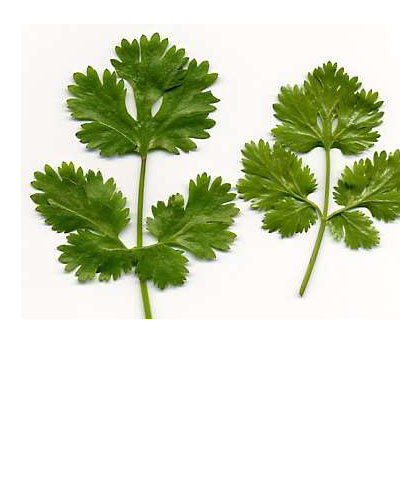Dhania
Latin: Coriandrum Sativum
Therapeutic Action:
Umbelliferae Medicinal Uses Antihalitosis; Aromatherapy; Aromatic; Carminative; Expectorant; Narcotic; Stimulant; Stomachic. Dhania is a commonly used domestic remedy, valued especially for its effect on the digestive system, treating flatulence, diarrhoea and colic[9, 244]. It settles spasms in the gut and counters the effects of nervous tension[254]. The seed is aromatic, carminative, expectorant, narcotic, stimulant and stomachic[4, 9, 21, 46, 147, 178, 201, 238]. It is most often used with active purgatives in order to disguise their flavour and combat their tendency to cause gripe[4, 244]. The raw seed is chewed to stimulate the flow of gastric juices and to cure foul breath[240, 268] and will sweeten the breath after garlic has been eaten[254]. Some caution is advised, however, because if used too freely the seeds become narcotic[4]. Externally the seeds have been used as a lotion or have been bruised and used as a poultice to treat rheumatic pains[254, 268]. The essential oil is used in aromatherapy. Its keyword is 'Appetite stimulant'[210]. Action The fruits of Dhania are: alterative, antibilious, antispasmodic, aphrodisiac, appetizer, aromatic, carminative, diaphoretic, diuretic, refrigerant, stimulant, stomachic, tonic. Fresh leaves are pungent and aromatic. The essential oil of Dhania stimulates the secretion of gastric juices and is a carminative and spasmolytic; in vitro it has antibacterial and antifungal effects. Uses Dhania is used for dyspeptic complaints, loss of appetite, and complaints of the upper abdomen. Dhania is also used traditionally for digestive and gastric complaints as well as for coughs, chest pains, bladder complaints, leprosy rash, fever, dysentery, externally for headaches, oral and pharyngeal disorders, halitosis, and post- partal complications. Dhania can be applied externally for rheumatism and painful joints. It improves the flavor of other medicinal preparations. At one time it was believed to have aphrodisiac effects. Chinese herbalists use Dhania seeds to treat indigestion, anorexia, and stomachache. Chinese herbalists suggests that Dhania herb can be used to treat influenza in which there is no sweating. Chinese Folk medicine uses Dhania leaves and seeds to help remove unpleasant odors occurring in the genital areas of men and women, as well as halitosis or bad breath. See the dosage recommendations and preparations below. Dhania Seed Oil had many medicinal uses. It has antibacterial properties and is used to treat colic, neuralgia, and rheumatism. The oil counteracts unpleasant odors in pharmaceutical preparations and tobacco. It is also used in perfumes, liqueurs and gin. Dhania seeds are ground into a paste for application to skin and mouth ulcers. Before the invention of toothpaste, Dhania seeds were chewed as a breath sweetener. Dhania oil is very useful in flatulent colic, rheumatism, neuralgia etc. Recommended dose is from 1 to 4 minims on sugar or in emulsion. The dried fruit of cardamom (generally used as infusion or decoction) is useful for the treatment of sore-throat, flatulence, indigestion, vomiting, other intestinal disorders, common catarrh and bilious complaints.
References:
- Nadkarni, Vol I, P 381- 383
- Leung & Foster P 193- 195
Used in:
- Gastrox Tablets
- Panchlavan Tablets
- Entrox Syrup

Copyright 2013 Unexo Laboratories Pvt. Ltd. All Rights Reserved. Designed & Developed By: Credence Technologies


